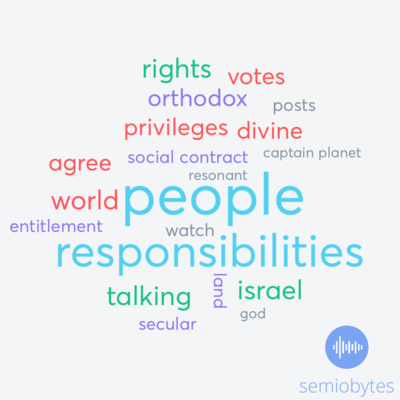
SemioBytes - Jewish and Christian Semiotics on Contemporary Issues
By Yoni & Terry

SemioBytes - Jewish and Christian Semiotics on Contemporary IssuesFeb 16, 2022

S4E5: Deep Adaptation, Climate Catastrophe, and the Jewish Perspective

S4E4: Do Jews Curse Christians & Other False Beliefs

S4E3: Rosh Hashanah

S4E2: Antisemitism on the Rise

S4E1: Flashbacks

S3E10: Habakkuk & the Nature of Prophecy, Part 2

S3E9: Habakkuk & the Nature of Prophecy, Part 1

S3E8: The Journey of the Soul

S3E7: Pledge to the Environment

S3E6: Terrorism at the Capitol

S3E5: Israeli-Palestinian Conflict ft. Guest Speaker Benji Davis

S3E4: Face Masks & Vaccines

S3E3: The Schmooze

S3E2: Cancel Culture

S3E1: The 2020 Election
In this episode, Terry and Yoni discuss the upcoming presidential election and what it means for years to come

S2E12: Season Finale

S2E11: Interview with Roger Hallam

S2E10: Climate Crisis ft. Guy McPherson Part 2 of 2

S2E9: Climate Crisis ft. Guy McPherson Part 1 of 2

S2E8: State of the Nation, Part 2 of 2

S2E7: State of the Nation, Part 1 of 2

S2E6: Antisemitism and Environmentalism, Part 2 of 2

S2E5: Antisemitism and Environmentalism, Part 1 of 2

S2E4 - Rights & Responsibilities
In this episode, Terry and Yoni discuss the difference between rights, responsibilities, and entitlements. Do we have rights, both secular and religious?

S2E3 - Shooter vs Terrorist
In this episode, Terry and Yoni discuss the terminology of shooter versus terrorist. In light of how many "shootings" happen in America on a regular basis, we feel it's time to call them terrorist attacks.

S2E2 - Extinction Rebellion, Part 2 of 2
In this episode, Terry and Yoni conclude their conversation on Extinction Rebellion and climate change catastrophe. This is part 2 of a 2 part conversation.

S2E1 - Extinction Rebellion, Part 1 of 2
Welcome back to season 2 of SemioBytes! During our break, both Terry and Yoni acquired their Doctor of Ministry in Semiotics degrees. In this episode, Terry shares his recent project: Extinction Rebellion and climate change catastrophe. This is part 1 of a 2 part conversation.

Season 2 Coming Soon

Season 1, Episode 9: Rehashing the Basics

Season 1, Episode 8: Jewish High Holidays

Season 1, Episode 7: Nation-State Law

Season 1, Episode 6: Kabbalah

Season 1, Episode 5: Yoni’s Israel Experience

Season 1, Episode 4: “The End” Signs

Season 1, Episode 3: Len Sweet, Part 2

Season 1, Episode 2: Interview with Dr. Len Sweet

Season 1, Episode 1: Introduction to SemioBytes
Who are Terry and Yoni?
What gives them the right to talk about such complex stuff on the web?
Tune in to find out!